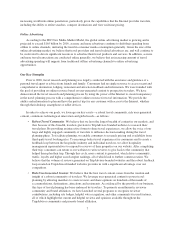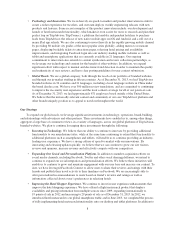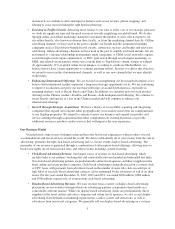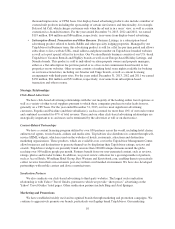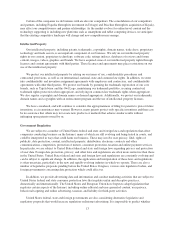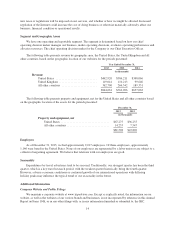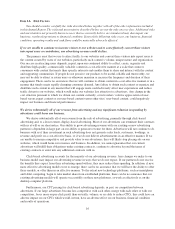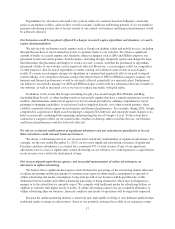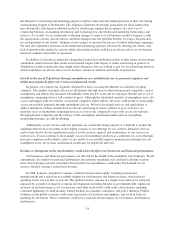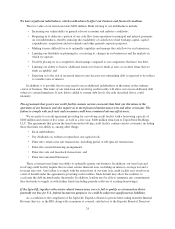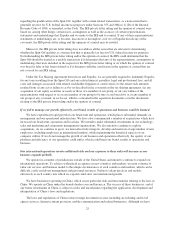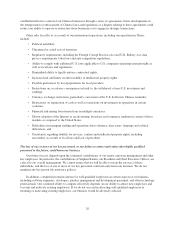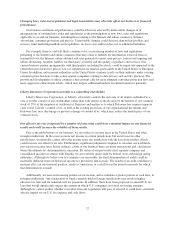TripAdvisor 2013 Annual Report Download - page 27
Download and view the complete annual report
Please find page 27 of the 2013 TripAdvisor annual report below. You can navigate through the pages in the report by either clicking on the pages listed below, or by using the keyword search tool below to find specific information within the annual report.Expenditures by advertisers also tend to be cyclical, subject to variation based on budgetary constraints,
project cancellation or delay, and to reflect overall economic conditions and buying patterns. If we are unable to
generate advertising revenue due to factors outside of our control, our business and financial performance would
be adversely affected.
Our businesses could be negatively affected by changes in search engine algorithms and dynamics, or search
engine disintermediation.
We rely heavily on Internet search engines such as Google on desktop, tablet and mobile devices, including
through the purchase of travel-related keywords, to generate traffic to our websites. We obtain a significant
amount of traffic via search engines and, therefore, utilize techniques such as SEO and SEM to improve our
placement in relevant search queries. Search engines, including Google, frequently update and change the logic
that determines the placement and display of results of a user’s search, such that the purchased or algorithmic
placement of links to our websites can be negatively affected. Moreover, a search engine could, for competitive
or other purposes, alter its search algorithms or results causing our websites to place lower in search query
results. If a major search engine changes its algorithms in a manner that negatively affects our paid or unpaid
search ranking, or if competitive dynamics impact the effectiveness of SEO or SEM in a negative manner, our
business and financial performance would be adversely affected, potentially to a material extent. Furthermore,
our failure to successfully manage our SEO and SEM strategies could result in a substantial decrease in traffic to
our websites, as well as increased costs if we were to replace free traffic with paid traffic.
In addition, to the extent that Google (including Google + Local and Google Hotel Finder) and Bing
(including Bing Travel), or other leading search or metasearch engines that have a significant presence in our key
markets, disintermediate online travel agencies or travel content providers by offering comprehensive travel
planning or shopping capabilities, or refer those leads to suppliers directly, or to other favored partners, there
could be a material adverse impact on our business and financial performance. For example, during 2011, Google
completed its acquisition of flight search technology company ITA Software and separately made changes to its
hotel search results, including both expanding and promoting the use of Google + Local. To the extent these
actions have a negative effect on our search traffic, whether on desktop, tablet or mobile devices, our business
and financial performance could be adversely affected.
We rely on a relatively small number of significant advertisers and any reduction in spending by or loss of
those advertisers could seriously harm our business.
We derive a substantial portion of our revenue from a relatively small number of significant advertisers. For
example, for the year ended December 31, 2013, our two most significant advertising customers, Expedia and
Priceline (and their subsidiaries), accounted for a combined 47% of total revenue. If any of our significant
advertisers were to cease or significantly curtail advertising on our websites, we could experience a rapid decline
in our revenue over a relatively short period of time.
Our success depends upon the acceptance, and successful measurement, of online advertising as an
alternative to offline advertising.
We believe that a significant discrepancy exists between the percentage of the advertising market allocated
to online advertising and the percentage of consumer time spent on online media consumption as opposed to
offline advertising and media consumption. Long-term growth of our business will depend heavily on this
distinction between online and offline advertising narrowing or being eliminated, which may not happen in a
manner or to the extent that we currently expect. We compete with traditional media for advertising dollars, in
addition to websites with higher levels of traffic. If online advertising ceases to be an acceptable alternative to
offline advertising then our business, financial condition and results of operations will be negatively impacted.
Because the online marketing industry is relatively new and rapidly evolving, it uses different methods than
traditional media to gauge its effectiveness. Some of our potential customers have little or no experience using
17


